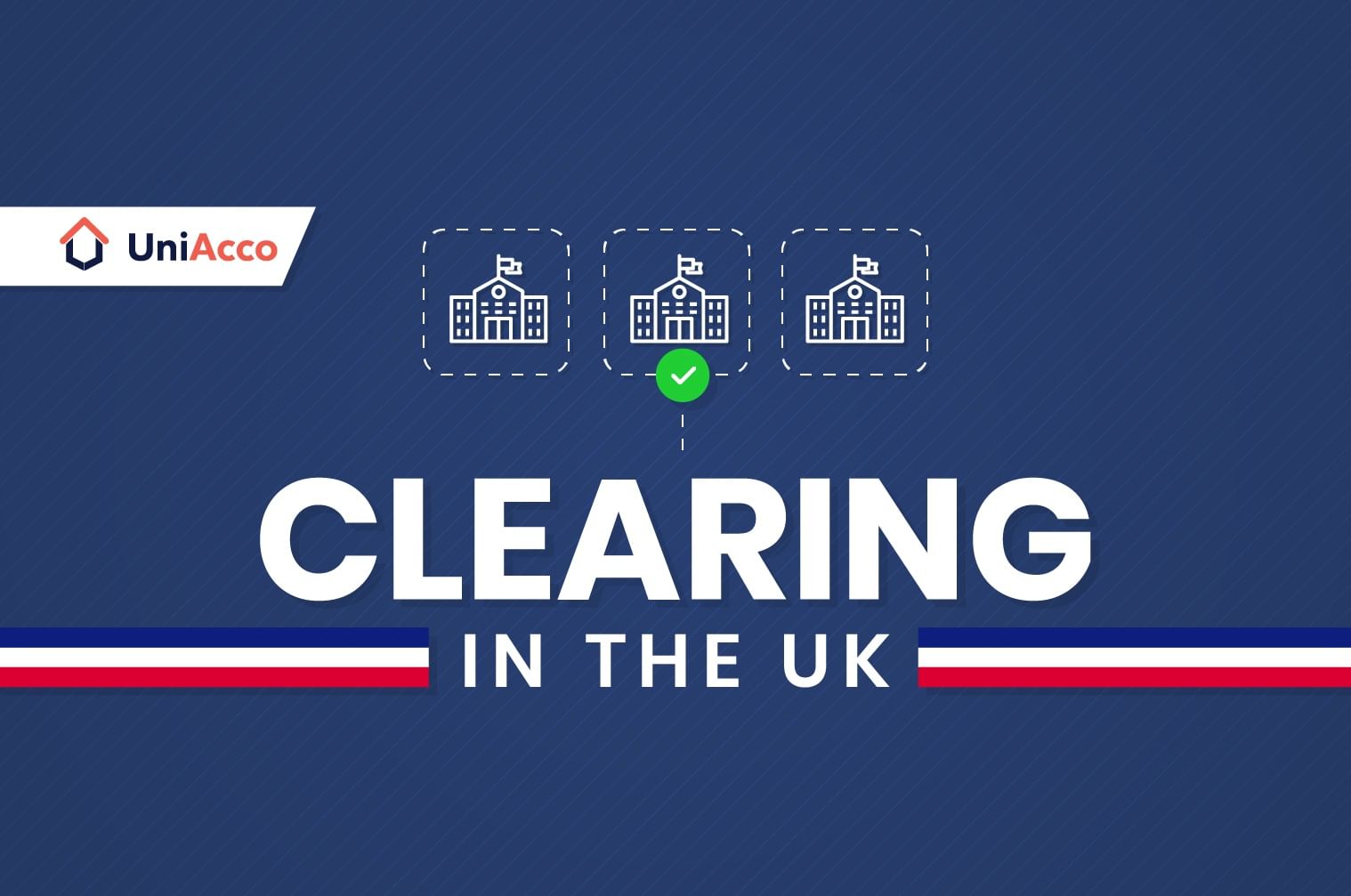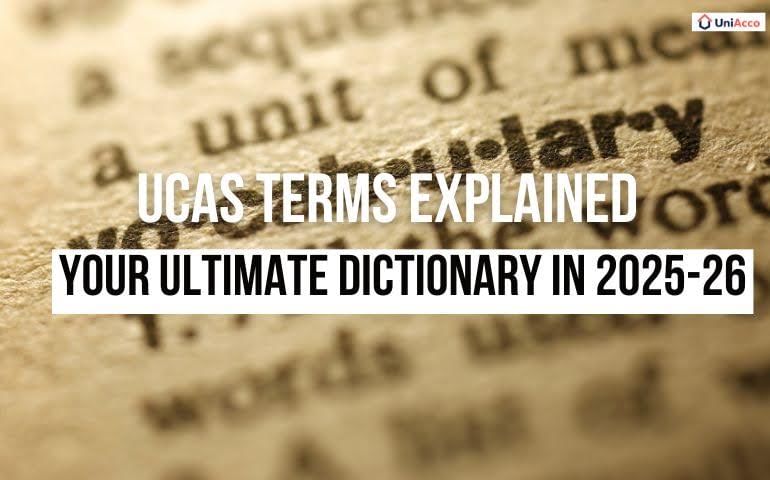We’re getting to the business end of the UK’s university admissions process. The process of Clearing in the UK sees the most intake of students into universities in the UK. Haven’t secured a place at your desired uni? No worries! With the help of University Clearing and Adjustment 2023, you will be able to study your choice of degree at one of the leading universities in the UK. If you’re still university-less and have no idea about the Clearing system in the UK, this blog will make you aware of all the things you need to know about Clearing.
What Is Clearing In The UK?
Clearing in the UK is a service by the Universities and Colleges Admissions Service (UCAS) that allows universities to fill spaces on courses that aren’t full yet. This offers students a second chance to pursue their further education aspirations. If you don’t already have a seat at university, then clearing is your best (and only) chance to fulfil your further studies aspirations. Currently, we’re right in the midst of the Clearing 2023, as it begins on July 5, 2023, and ends on October 18, 2023. You may undertake as much research as you like before results day to identify courses and institutions that interest you so that you can call them on the big day.
Conditions For Applying To Universities Through Clearing

The essential condition for applying to universities through the UK University Clearing system is –
- You have not received an offer from a university in the UK or don’t plan on accepting any offer you currently have.
Other conditions to apply for Clearing in UK universities include-
- You apply after 30 June for uni Clearing.
- You didn’t meet the conditions of your offer or aren’t planning on accepting your offer letter.
- You have paid £27 as a part of the multiple-choice application fee.
- You got better grades than predicted. Can you apply for a different course through Clearing? Yes, you can if you get better grades, as this enables you to get a place on a different course at a university that asks for higher grades through UCAS Clearing and Adjustment.
- Can you apply for a different course through clearing? Yes – if you’ve changed your mind about doing the course you initially applied for and want to apply for another course, it can be done through the process of Clearing in UK universities.
What Are The Important Dates For Clearing?
Hope you’ve got your answer to ‘What is Clearing in UK universities?’. Let’s move on to the next common question asked during this process. When does uni Clearing end? As mentioned earlier, Clearing takes place between 5 July – 18 October. However, please note that you cannot apply to university UK Clearing until you have your exam results in hand. Here are some important dates for clearing as per UK timings-
- 30 June 2023 at 18:00: UCAS Undergraduate applications received after this date go into Clearing.
- 4 July 2023: Last day for applicants to add an Extra choice in their application.
- 6 July 2023: Publication of International Baccalaureate results.
- From 5th July 2023 onwards: Clearing opens, displaying vacancies in the search tool, and Clearing numbers show for eligible applicants.
- 31 July 2023 at 18:00 to 8 August at 09:00: Results embargo period, during which applications and adviser portals are not updated.
- 8 August 2023: Publication of SQA results.
- 11 August 2023 at 14:00 to 17 August at 08:00: Results embargo period.
- 17 August 2023: Publication of JCQ results.
- 24 August 2023: Publication of GCSE results.
- 28 August 2023 at 18:00: Last date for receipt of UCAS Conservatoires applications.
- 6 September 2023: Remaining offer conditions must be met, and the last date for applicants to decline their place.
- 21 September 2023 at 18:00: Last date for receipt of UCAS Undergraduate applications.
- 17 October 2023: Last date to add Clearing choices and for universities/colleges to make decisions.
Keep these dates and deadlines in mind as it is very important for you to know -when does uni Clearing end?
What Are The Top 2023 Universities For Clearing?
The top universities in 2023 for Clearing are listed below –
- University of Bath
- University of Warwick
- Loughborough University
- University of Glasgow
- The University of Edinburgh
- University of Aberdeen
- Lancaster University
- University of Exeter
- University of Southampton
- University of Strathclyde
- University of the Arts London (UAL)
- University of Leeds
- University of York
- Aston University
How Does Clearing Work?
How does uni Clearing work? If you haven’t already applied for Uni Clearing, you must register and apply. The best part of applying through the UK university Clearing system is that you get an opportunity to apply for courses in subjects you hadn’t originally applied for and to universities that may have previously rejected you earlier in the year.
Students who haven’t met the entry requirements for their chosen courses, or haven’t received an offer from a UK university, are automatically entered into Clearing. Although some universities like the University of Cambridge and the University of Oxford don’t take part in Clearing, the UCAS website lists thousands of course vacancies from top universities on A-level results day. For instance, over 30,000 courses were available in 2019.
During the Clearing process in UK universities, you will be asked to select courses of interest that still have spaces to fill. It is always wise to contact the university you wish to attend, so contact the relevant universities directly to confirm whether they’ll offer you a place.
There are trained advisors who are manning university hotlines to guide you through the process. Before you add a Clearing choice in Track, you need to call the university and give them your Clearing number and Personal ID so that they can look up your application. Once you’ve received a verbal offer, added to Track and confirmed by the university, your place is guaranteed.
Once your place at university is guaranteed, it’s time to start thinking about your accommodation. Lucky for you, UniAcco is ready to wow you with a variety of stunning student accommodation options from all over the UK. Use some of our many exciting offers like “Book Now, Pay Later”, “No Deposit Required”, “UniAcco Exclusive £50 Caack Offer”, “Flexible Check-in Policy”, and much more. So visit the UniAcco website and secure your dream accommodation in the most hassle-free way. We hope this helped to solve your query on how uni Clearing works.
What Is UCAS Adjustment? | Clearing In The UK
UCAS Adjustment is a feature that allows students to select a better university in case they achieve better results than expected. It also allows students who’ve met or exceeded expectations for a firm conditional offer to swap places for another course. Prominent universities in the UK, like the University of Cambridge and the University of Strathclyde, take part in Adjustment.
How To Apply For Clearing 2023?
You will find all the vacant courses by universities in the UK listed on the UCAS website. You can use the search tool to browse courses based on subject, location, and university.
In order to apply to universities, you will first need to fill out your basic details. Once you finish registration, you will be assigned a unique Clearing number and invited to use the Track service. From there, follow on-screen instructions to apply to the university.
You will be required to give the university your Clearing number and personal ID number so they can view your online application. Verbal offers will be made over the phone, but make sure you accept only one. You can add only one choice at a time. If the university does not confirm the offer, you will be permitted to look again.
Do I have to pay for Clearing?
International students can apply to undergraduate programmes at UK institutions through Clearing in the same way that local students can. In reality, this is done in several secure places annually. Simply submit your application through UCAS and pay the £27 application cost. International students can apply to universities through Clearing together with other students, even if they did not apply before June 30. However, if you wish to apply through the regular Clearing procedure, you will still need to submit a UCAS application form.
University Clearing Tips
Stay calm – If you don’t happen to secure the grades you were expecting, it’s okay. Do not panic. You can look at other courses that don’t demand high grades.
Take advice – From your parents, teachers, tutors, and older students who’ve gone through the Clearing Process in UK universities.
Book your accommodation ASAP – Secure your accommodation at the earliest to avoid paying higher rates when universities start. UniAcco offers the most diverse room types at the most attractive prices.
Consider retaking your exams – This is a good idea if your heart is set on one particular subject. Speak to your teachers for the best advice.
Be aware of dates – There’s nothing worse than missing an important deadline, especially when it comes to securing your seat at uni. Hotlines will stay open until September, giving you time to discuss your options with those closest to you.
Do your research well – Browse websites, speak to your students, go on virtual tours, check social media channels, and visit university campuses. Only when you’re completely certain about a decision should you put in a formal offer via Track.
Be patient – Thousands of students will apply through Clearing, so don’t get frustrated if you don’t secure a seat immediately. If you haven’t heard back by the following day, give them a call to find out about your place.
Source: UCAS
FAQs
Q1. How long do universities take to respond to applications in 2023 UK?
Ans: The response time for applications to UK institutions in 2023 may vary, but it will normally take several weeks to a few months.
Q2. What is the clearing process in the UK?
Ans: In the United Kingdom, clearing is the process through which universities fill remaining course spaces, and it allows students who have not yet secured a seat to choose other possibilities.
Q3. How long does SC clearance take in 2023 UK?
Ans: SC (Security Check) clearance in the United Kingdom in 2023 might take several weeks to a few months, depending on the unique circumstances.
Q4. Is it hard to get a clearance?
Ans: Obtaining clearance can be difficult since it requires a complete background investigation as well as satisfying the requirements and standards specified by the relevant agencies.
We hope you liked this article. To know more about related fields, do check out our other blogs.















0 Comments